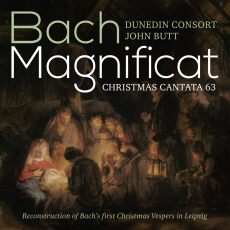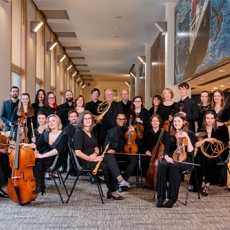Dunedin Consort - J.S. Bach: Magnificat - Europadisc
The Dunedin Consort's
ongoing traversal of Bach's major choral works reaches Christmas in this latest
release on the Linn label. Alongside the early, E flat major Christmas version
of the Magnificat (complete with four seasonal interpolations) it
presents not only the joyous Christmas cantata Christen, ätzet diesen Tag, BWV 63, but a selection of organ appropriate
chorale preludes, congregational hymns and an introductory double-choir motet
by Giovanni Gabrieli. The result is a model of richly contextualised
music-making to match the Dunedin's earlier recording of Bach's St John
Passion, which proved such a critical success.
The extra
items serve not just to frame the two main works, setting off their brilliant
scoring, but also to affect the shape and rhythm of the whole event: an
abridged re-creation (no sermon!) of the Vespers service on Bach's first
Christmas Day in Leipzig (1723). The cantata dates back to his Weimar years,
but its scoring (including no fewer than four trumpets, the most he ever used)
was clearly chosen to impress his new employers. So too was the scarcely less
opulent yet remarkably concentrated Magnificat setting (probably composed for the Feast of the
Visitation on 2 July 1723). In both these works, Butt and his musicians combine
an earthy exuberance (trumpets and drums gloriously forthright) with some
beautifully sensitive and ethereal singing and playing. With no more than two
voices per part in the choruses, the upper voices combine tonal purity with a
tasteful degree of passion, while the male voices add a particular pungency.
Standout
moments in the cantata include the first recitative, with rapt strings
accompanying alto Clare Wilkinson's superbly pointed declamation; the first
duet, an Adagio in which soprano and bass (Joanne Lunn and Matthew
Brook) weave an expressive braid with Alex Bellamy's sinuous oboe solo; the
dance-like second duet, and bustling concluding chorus.
In the Magnificat, alert listeners will notice the many, often subtle
differences between this E flat version and the more familiar D major score.
With recorders instead of the D major's flutes, this version has a more
'grounded' feel, and the Dunedin Consort make the strongest possible case for
it. Solos (vocal and instrumental) are outstanding, and tenor Nicholas Mulroy
really comes into his own in an imperious account of 'Deposuit potentes'.
Throughout, Butt keeps the momentum flowing, not just within but between
movements, so that the four Christmas inserts feel thoroughly integrated into
the overall scheme.
Most of
the organ preludes are taken from Bach's Orgelbüchlein, and are jewels in their own right; here they not
only serve to enhance the hymns they introduce, but benefit hugely in turn from
being heard in liturgical context. They, like the Magnificat fugue, BWV 733, which makes a superb
curtain-raiser for the Magnificat itself, are performed on the Peter Collins
organ of Greyfriars Kirk, Edinburgh, with John Butt and Stephen Farr sharing
duties at the console.
The
Gabrieli motet makes a splendid opening item, and the Dunedin singers are
joined by fifty or so 'extras' in the congregational chorales, which are
accompanied in the highly idiosyncratic style that bach is known to have
employed.
The whole
project is underpinned by Butt's customary combination of sound scholarship and
inspired musicianship, and Linn's excellently focused recording is of
demonstration quality. With four extra tracks (including a blessing with
harmonised response) available from the Linn website for further context, this
is an enormously satisfying and enjoyable disc, reinforcing yet again the
Dunedin Consort's enviable reputation in this repertoire.


